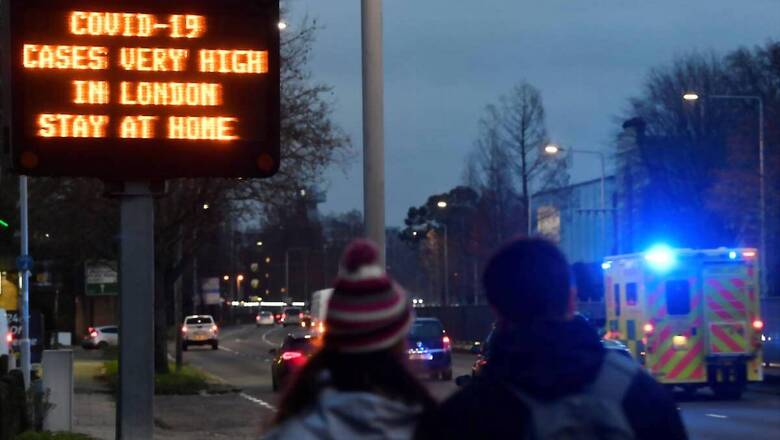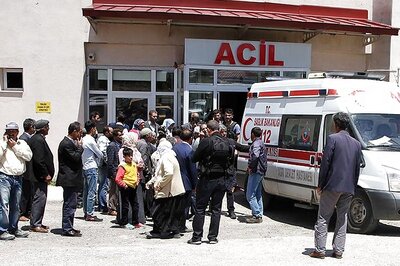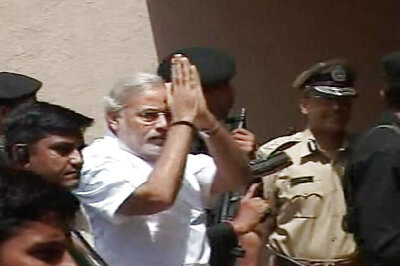
views
The advent of a new fast-spreading coronavirus strain has tangled up the already demanding global battle against the Covid-19 pandemic. In an interview with CNN-News18, Dr Randeep Guleria, director of AIIMS and member of the national task force on Covid-19 management, explains the implications of the virus mutation, the preparations required to combat it, and the situation on the vaccine front.
Thank you for speaking to CNN-News18. How worried should we be for this new UK strain? We are being told by the government of India that there has not been a single case so far but that could change pretty quickly.
Your point is well taken and I think we need to be careful because we are in a good situation right now as compared to many parts of the world. Our cases have come down. We are seeing a good downward trend. Our recovery rate is very good. Our mortality rate is also very low. So, we really don’t want to have a resurgence of new cases because of this new strain. However, whatever data we have got from the UK, London and South East London, suggests that this new virus or new mutant is more infectious but it doesn’t lead to more hospitalisation or increased mortality. Therefore, we need to be more vigilant in terms of Covid appropriate behaviour. Even if this strain comes into India, if we are vigilant in terms of physical distancing, wearing a mask and following Covid appropriate behavior, then we would not allow it to spread in our community and that would help in containing the number of cases that can happen because of this new virus that spreads very quickly.
So are you saying that the new virus spreads very quickly but the impact is necessarily not greater? Is that what you are saying?
So in terms of the number of people getting the disease, it may be more but the number of people dying or going to hospital due to Covid-19, that the data doesn’t support right now.
Are then the symptoms of this new strain any different and does that impact the line of treatment?
I think that it is very important for us to understand that although we are calling this a new strain or a new variant, this is one of the ongoing mutations that the virus continues to have. This virus has had many mutations, almost on an average of two per month, and therefore mutations are continuing. But at the same time, symptoms continue to be the same and the treatment strategy continues to be the same. As per the current data, the vaccine should also be effective.
The study conducted by the doctors at the Imperial College of London says that data seems to be suggesting that this virus or new strain tends to impact children as much as it impacts the adults. Now that is not something that we saw in the original coronavirus. What are you hearing on that and why do you think that’s the case?
I think what we are seeing is that it tends to spread more in the younger population and therefore it is something we need to be concerned about, but you know whenever you have this data, you need to look at it very critically. For example, you are seeing an increased number of cases, so is this related to the virus? Or is it also related partly to the festive season in the UK? People there are crowding together, going to the markets and also the younger age group is also doing the same. So, I think it is very important to tease out the data properly before we could really conclude that this new strain is sort of more infectious to the younger age group.
Does this in any way impact India’s vaccine roll-out? I ask you this question because we don’t have enough data right now. What if we start inoculating people and then we suddenly find out that whatever vaccine we started to go ahead with is not effective to this new strain?
So this is something that happens but we are in a lucky position that it is unlikely to happen with Covid-19 or coronavirus. But if I sort of give you a corollary of influenza…Influenza virus also tends to mutate very quickly unlike coronavirus which mutates much more slowly, and that is why for influenza, we have an annual vaccine, because the virus has mutated significantly every year and we need to have a new vaccine. Also, what has been happening in the past, that we were giving a trivalent vaccine which was covering three strains- 2 Influenza A and 1 influenza B strain. A few years ago, the surveillance data showed that another B strain was also circulating in the world and this led to a quadrivalent vaccine which is what we are giving right now. So, vaccines will evolve as the virus will evolve and therefore, this is an ongoing process. So most of the vaccine manufactures can tweak the vaccine so that it becomes effective if there is a major change in the virus. Currently, in Covid-19, there doesn’t seem to be a major change, so, as of now, I don’t really think that we need to look at a major change of the vaccine.
In the face of a new mutation, does the concept of herd immunity stand at all? There is a report by the government of India that is saying that 60% of India already may have antibodies, they already may have been impacted. But is there any use of those antibodies if they don’t work against this new strain?
It is important for us to understand that it is still Covid-19, the virus has mutated and changed a bit but overall our immunity is still going to be there. We have viruses that have two processes: one is antigenic drift, that is the change or mutation which this virus has done but the inherent immunity stays the same. Then we have, which we call an antigenic shift and that is when we say that there is a major change and a new virus has come in, a new strain, and that can then cause the problem like we had in the case of H1N1 swine flu pandemic or the Covid-19. So that doesn’t seem to have happened right now.
Essentially, the sum of what you have said right now is that don’t panic. Fine, let’s not panic, but my question to you is that is it time possibly for India to kick in a graded response, because flights from the UK have been suspended until the 31st of December. At least two states in this country have put in night curfew. Will we see more of this as we go forward? Should we see more of this as we go forward?
What will really determine this is how the cases pan out in the upcoming days. If we find that the cases continue to decline and we are in a good condition, then we really don’t need to panic and we don’t need to get any graded response. But if we have areas where there is a certain spurt of new cases…we will work on a strategy that we already have in place; in terms of containment zones, tracking, testing and tracing individuals and at the same time, having strict containment measures. I don’t think that we are in that situation right now. We need to be more careful right now.
So what is your advice as a doctor to everyone? A: Don’t panic about the UK strain; and B: Continue to wash your hands and wear your mask, right?
Correct. So if we continue to have Covid-appropriate behavior, no matter whatever be the strain, we will stay protected, and the second thing is that we need to understand what the data suggests and it is too early to say that this is something which is going to create problems in terms of mortality or in terms of vaccine efficacy. I think that the current data suggests that both these things, in terms of mortality and efficacy, are something that we can be comfortable about.
Dr Guleria, speaking of vaccines, and I am fairly certain this question is asked to you at every hour of the day, realistically speaking, when should we expect a vaccine roll-out? When should we expect the first jab? By when do you think that the entire country or the people need to be inoculated will be inoculated?
There are two parts in this. When will we be able to get the approvals for the vaccine, when will the regulatory approvals come. And the second is that when will be able to roll out the vaccine so that people can get it. So the first part is that the vaccine manufacturers will have to give sufficient data to the regulators so that they are satisfied about two things. First, the vaccine is absolutely safe, and the second is that it is efficacious. I think that the data is being collated and as far as the SII vaccine is concerned, there is a large body of data from AstraZeneca which would also be available. So I am hopeful that regulatory approval will occur sometime by the end of this year or early next year, and then once that is done, then we have the second part of when do we roll out the vaccine. And that is going to happen in a phased manner, the early part in which the healthcare workers or the frontline workers will get done in the first few months, but subsequently the other groups will follow and it will take at least 6-8 months to really say that everyone is being vaccinated in the priority list that we have. It is not going to happen overnight and it is not going to happen in 5-10 days. It is going to happen over many weeks.
Dr Guleria, then the most logical question. We are still waiting for the emergency use authorisation. I think Bharat Biotech has applied or is wanting to apply for EAU. If Pfizer is good enough for the UK, if it is good enough for the US, if it is good enough for Bahrain, for the UAE or for Canada, then why is it not good enough for us?
So there are two things in this. The first is that when you are looking at a vaccine, you also have to look at its efficacy in a given population. It is very likely that it’s good enough for us. Drugs and vaccines may have some ethnic variations and we don’t want that there is a rare side effect that happens in India which we don’t see being reported in the Western population. So we have to have good safety data and the regulators will look at all safety data and it is possible that a sufficient number of Indians who are settled in other countries and are being vaccinated show that it is safe and it can also be used. And the second issue is when we have the vaccine then what is the feasibility of rolling out the vaccine in the entire country. Now let’s say we have the Pfizer vaccine which needs to be stored at -70 degree centigrade, then it needs to be transported at that temperature. It is going to be a huge task to do that and it doesn’t seem feasible that we are going to vaccinate a large number of our population if we go down that road. The SII vaccine and the Bharat Biotech vaccine need 2-8 degree temperature to be stored which is what can be kept in an ordinary fridge. And this is something which we already have as far as the immunisation programme for the children and pregnant women is concerned. We already have a good infrastructure as far as the SII and the Bharat Biotech vaccine is concerned for the whole country. We just need to upscale it as the number of children being vaccinated is small but the number we want to vaccinate is much larger.
As and when the vaccine comes, would every Indian be required to take it?
There are two parts which we need to achieve as far as the vaccine is concerned. We need to decrease mortality. The number of people who are dying because of Covid-19 needs to come down. We have to vaccinate all the high- risk groups, the elderly, all the people with comorbidities. They become number one priority. The second is the healthcare workers or the frontline workers who are getting exposed or getting the infection. Once we start doing that, we will also have to see that do we have sufficient mass of people who we have vaccinated and have we now been able to break the chain of transmission. Because, remember, if we have vaccinated a sufficient mass of people, many of our citizens would have already got the infection and recovered, and will have immunity on their own. So once we receive the herd immunity, then we don’t need to be that aggressive in vaccinating everyone. But till we achieve that, we will have to continue to vaccinate so that the number of cases comes down to at a very low level and we are able to protect all those who are dying because of Covid-19.
But I could have antibodies today, and I may not have those antibodies five months down the line.
So that is not just true for antibodies but for the vaccine as well. So we really need to follow up and see how long does the vaccine efficacy last. Does it last for six months, one year or two years? Current data suggests that it would at least last up to six months, but we need to have follow-up data to see that. And that is true for antibodies as well. So once we have more data, we will be able to show that. But currently it seems like we have sufficient degree of protection because when we start looking at reinfection, the number of people getting reinfection is very small… So as of now, it seems that the people who have got the infection, let’s say six or seven months ago, still have some degree of protection as we don’t see a case of reinfection in a large number of them.
Dr Guleria, it may seem like a silly question to you but I really want to have a clarification. If the efficacy of the vaccine is let’s say six months or one year, then does it mean that we would have to get a vaccine every year?
So it is possible. Let me explain this in two or three ways. One is that it depends on how long the immunity lasts, and also if the virus stays the same or the virus has mutated and now we need to have a new vaccine. I gave you the example of the influenza where we need an annual vaccine because of the fact that the virus mutates and changes. So the decision to revaccinate depends on how the virus has behaved and how long the immunity lasts. The second issue that is very important to understand is that we have more than 50 vaccine candidates which are in the clinical trials. So the good vaccine that is available now, may not be the best vaccine and we don’t want the good to become the enemy of the best. So, we may have over the next few months, over eight months for more data to come in and a better vaccine may be available and then we will have to do a course correction and relook at our strategy. The next year is going to be very interesting as far as the vaccine is concerned because it will give us an idea about how long does the vaccine give us protection and how the other vaccines behave. So that should be the ideal strategy for vaccinating people in the long run.
My last question to you. It falls under the realms of ‘Mungerilal Ke Haseen Sapne’. But I am assuming that six months, eight months down the line, or a year down the line, we will have multiple vaccines for the coronavirus in the market. If it comes to a choice, as and when that happens, how do you make that choice? How do I decide that this vaccine will suit me better than that vaccine?
That is going to be a tough question and I feel that it is going to be even tougher as there is going to be a lot of industry pressure also as to which vaccine to take. It is something which will be a very good situation because then we will be spoilt for choice but I think we will have to look at the data from the degree of immunity and for different age groups. So is this vaccine providing better immunogenicity for the elderly? So, maybe this is better for the elderly, so maybe this is providing better immunogenicity for the people with comorbidities, and therefore looking at all of that, we will have to take a call. So I think that is something which is evolving and this is why I said that the next year is going to give us a lot of information. These are early days, so I think in the first stage, we shall take whatever vaccine we are getting which is going to decrease the mortality and the number of cases and then over the next one year, we will have a better idea of which is the vaccine that we can really look at on a regular basis if need be or as a one-time thing to prevent both the infection and the disease. You may have a vaccine which is preventive of getting you the disease, what that means is that you take the vaccine and may still get Covid but that is a mild form of Covid and you will not need severe kind of hospitalisation. But we may also have a vaccine that gives you enough antibodies that you take the vaccine and don’t get Covid at all, it protects you from getting Covid at all and that would be an ideal situation. All of this will evolve over the next few months.
Read all the Latest News, Breaking News and Coronavirus News here




















Comments
0 comment